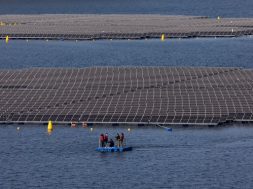
New analysis from Bloomberg New Energy Finance suggests that from 2022, the cost of electric cars will start to drop below that of internal combustion engine (ICE) vehicles.
It has been noted, not least by today’s recent poll issued by the Climate Council, that many drivers are waiting until electric cars are at least as affordable as ICE equivalents before making the switch to electric. They may not have to wait long.
As noted by Nathaniel Bullard at Bloomberg, ” The crossover point — when electric vehicles become cheaper than their combustion-engine equivalents — will be a crucial moment for the EV market.”
For this reason, BloombergNEF regularly assesses the cost of purchasing EVs against equivalent ICE models, and Bullard notes that the disparity between EV/ICE pricing is getting smaller every year.
In this year’s bottom-up analysis, the figures indicate that as soon as 2022, large EVs in the EU will be cheaper than their ICE equivalents.
The reason behind this is by and large due to falling battery prices – which for years amounted to around half the total cost of an electric car.
But that percentage is less and less, with batteries in today’s EVs only accounting for a third of the total cost.
By 2025, BloombergNEF’s analysis predicts it will be as low as 25%.
Falling battery costs are not the only contributor to price parity for EVs, author of the BloombergNEF report Nikolas Soulopoulos notes.
Chassis and body costs will also drop, he says, while the same are likely to rise for ICE vehicles that will need to add measures to comply with stricter emissions targets.
Additionally, with market demand increasing for electric cars, large-scale production (and hence per unit cost reductions) of electric drivetrains will also become a factor in falling EV prices – in fact, Soulopoulos suggests that by 2030, motors, inverters and power electronics costs could be 25-30% less than today’s costs.
The figures from BloombergNEF’s analysis adds weight to similar recent reports, such as one from the International Council on Clean Transportation that says that electric cars could be cheaper than petrol/diesel as soon as 2025.
Another, issued in January by market analysis and research firm Deloitte, says that with 21 million EVs predicted to be on the road by 2030, the total cost of ownership for EVs could be on par with ICE equivalents as soon as 2021 in the UK, and globally by 2022.
This would be good news for Australians, who are seemingly putting off buying a new car over the next four years while they wait for more electric options.
With half of 861 Australian voters surveyed in the poll issued today by the Climate Council saying they will wait until electric cars are as affordable as petrol and diesel equivalents, price parity for electric cars won’t come a moment too soon.
















